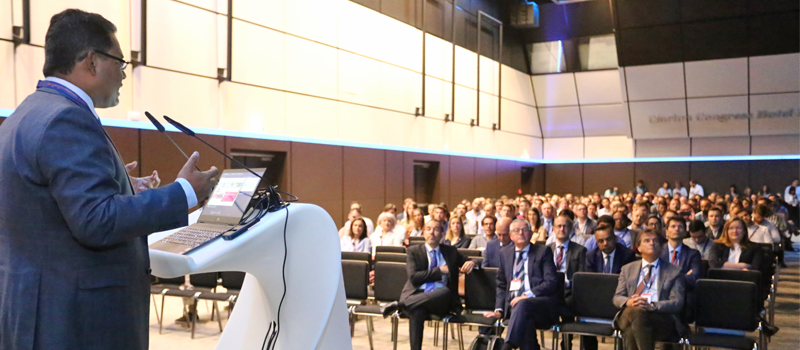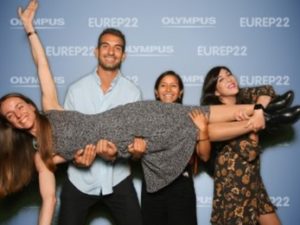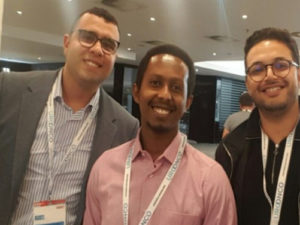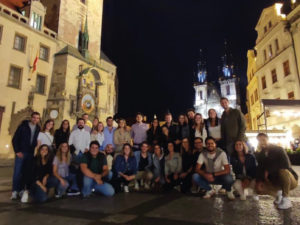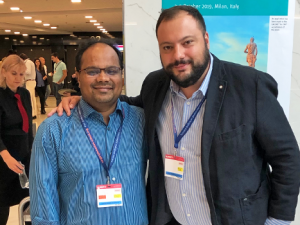Esteemed EUREP tutor of five years, Professor and Consultant Urological Surgeon at the University Hospital Southampton, Prof. Bhaskar Somani (GB) shares his experiences as the new Coordinator for the hands-on training (HOT) sessions and his aspirations for the programme.
New tasks and tutor responsibilities
The responsibilities of a HOT Coordinator begin before the sessions start. “I select the tutors, and I liaise with a company to ensure that the correct equipment and kits are provided for the four Transurethral resection (TUR) stations, five endoscopic skills stations and 15 laparoscopic skills stations,” stated Prof. Somani.
His role involves discussions with the tutors on what could be improved and the troubleshooting of trainee- or equipment-related issues, on a daily basis. The tutors were also asked to identify the trainees who performed well during the HOT sessions, and encourage said trainees to take the European training in basic laparoscopic urological skills (E-BLUS) and Endoscopic Stone Treatment step 1 – basic (EST-s1) exams.
Memorable EUREP19 moments
“The hard work and passion for teaching shown by tutors; the trainees’ hunger for learning and their drive to improve were extraordinary,” said Prof. Somani. “One notable example was when one of the tutors in the laparoscopy station stayed behind to help a trainee complete all the E-BLUS training tasks. They finished at 9:30PM, which was well beyond the routine completion time. The tutor knew that he would miss dinner with rest of the EUREP group, but he still decided to put his trainee’s needs first. This gesture showed true dedication and commitment as an educator.”
Prof. Somani mentioned another trainee who, instead of taking her lunch break, went through the training exercises to prepare for the E-BLUS exams instead. “Her hard work paid off. Not only did she pass but she did well in her exams.”
Objectives reached
EUREP has grown since its inception, with its standardised training format and dedicated faculty providing a solid programme. According to Prof. Somani, the trainee demographics, filled slots, evolution of protocols and technologies applied show that EUREP’s objectives are being achieved.
“Even though majority of the trainees are from Europe, participation from non-European countries suggests further collaborations between the ESU and national societies, and wider dissemination of simulation training worldwide,” said Prof. Somani.
He added that due to massive interest in HOT courses and exams, all training and exam slots during EUREP19 were filled.
Prof. Somani stated that the standardised training protocols allow for more accurate and measurable training based on the trainees’ needs. “While basic models are more useful to novices, more advanced models will allow complex and more realistic training. A combination of didactic teaching and a supervised HOT improve surgical ability as well as provide real-life, operating-room environments.”
Aspirations for the programme
Prof. Somani describes EUREP goals in the next two years which will also deliver long-term results. “We will further improve the programme with endoscopic stone treatment step 2a (EST-2a), laparoscopic intermediate skills and endoscopic lower-tract curriculum development. We aim to maintain EUREP’s high standards that were achieved over the last decade through thorough tutor selection, curriculum updates that meet the trainees’ needs, and continuous improvement based on received feedback.”
Acknowledgements
Prof. Somani would like to thank all the HOT tutors who put in their effort to make EUREP a success. The vision of European School of Urology and their “Training and Research group” has led to one of the most successful simulation training programmes of all time.
References
- Somani BK, Van Cleynenbreugel B, Gozen A, et al. The European Urology Residents Education Programme Hands-on Training Format: 4 Years of Hands-on Training Improvements from the European School of Urology. Eur Urol Focus. 2018 Mar 14. pii: S2405-4569(18)30080-4. doi: 10.1016/j.euf.2018.03.002. [Epub ahead of print]
- Veneziano D, Ploumidis A, Proietti S, et al. Evolution and Uptake of the Endoscopic Stone Treatment Step 1 (EST-s1) Protocol: Establishment, Validation, and Assessment in a Collaboration by the European School of Urology and the Uro-Technology and Urolithiasis Sections. Eur Urol. 2018 Sep;74(3):401-402.
- Somani BK, Van Cleynenbreugel B, Gözen AS, et al. Outcomes of European Basic Laparoscopic Urological Skills (EBLUS) Examinations: Results from European School of Urology (ESU) and EAU Section of Uro-Technology (ESUT) over 6 Years (2013-2018). Eur Urol Focus. 2019 Jan 17. pii: S2405-4569(19)30007-0. doi:10.1016/j.euf.2019.01.007. [Epub ahead of print].

